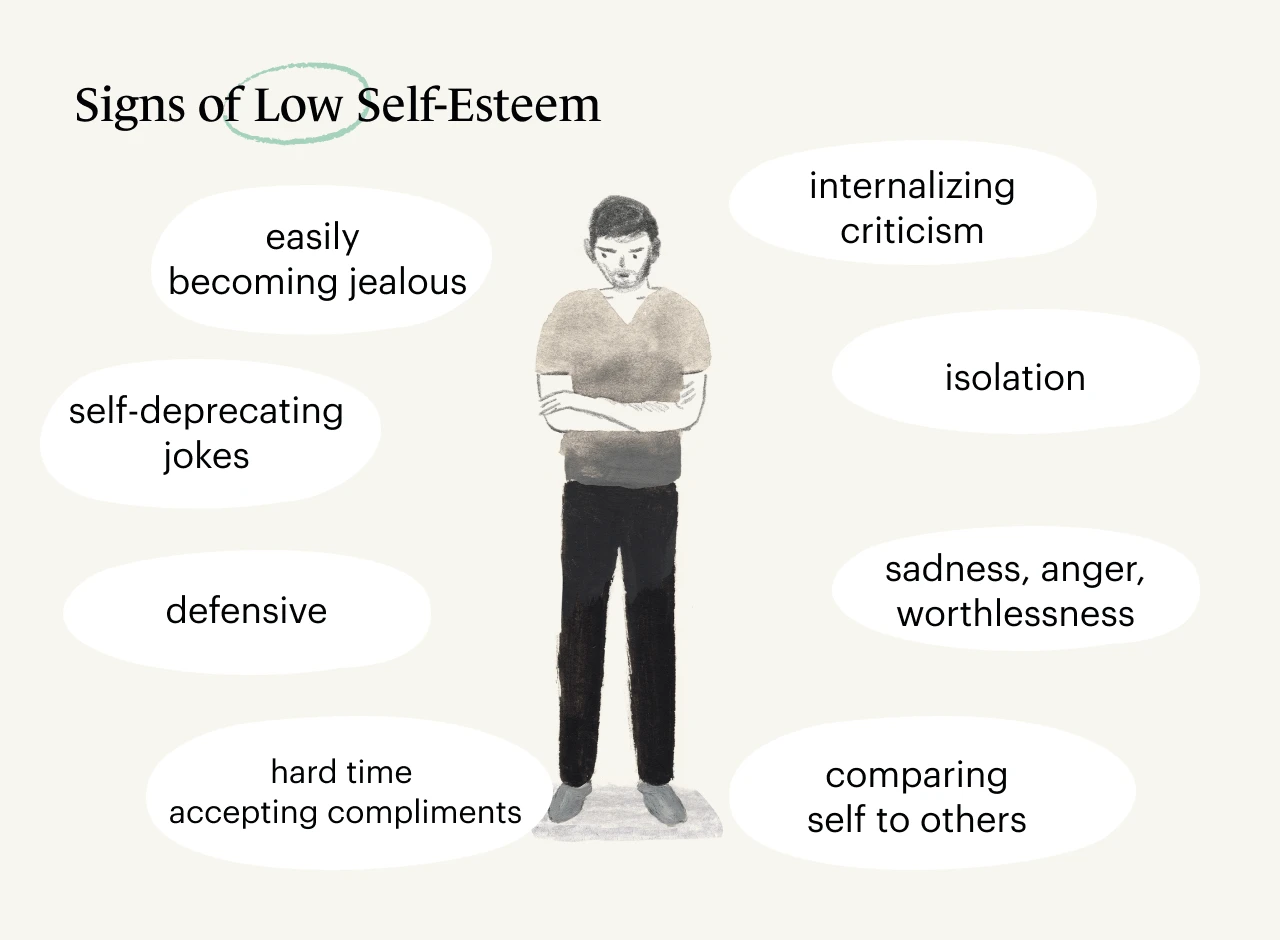Do I have low self-esteem?
How can I build my self-esteem?
Why is self-esteem so important?
If you're asking any of these questions, we're glad you're here. And we hope we can help.
In her novel, Are You the One for Me?, personal growth adviser and author Barbara De Angelis wrote on the topic of self-esteem: "If you aren't good at loving yourself, you will have a difficult time loving anyone, since you'll resent the time and energy you give another person that you aren't even giving to yourself."
How we feel and treat ourselves, is the foundation for how we live our life and interact with others.
It’s a simple quote and speaks an important truth: How we feel and treat ourselves, is the foundation for how we live our life and interact with others.
Let’s dive in to explore the three types of self-esteem, the meaning of self-esteem, why self-esteem’s important, signs of low self-esteem, and, finally, ways to build our self-esteem.
And, yes, there are even therapists who can help us with improving our self-esteem.

First, what's self-esteem?
Self-esteem is the measure of one’s own worth and overall opinion of one’s self.
According to the American Psychological Association (APA), self-esteem reflects our physical self-image, our own view of our accomplishments, capabilities, and values and our perceived success in living up to them, as well as the ways in which others view and respond to us.
What are 3 types of self-esteem?
According to therapist and Monarch Directory expert reviewer Ellen Biros, MS, LCSW, “In a reasonably healthy person, self-esteem does fluctuate, and the fluctuations are normal, but temporary.”
Do you recognize these three types of self-esteem in yourself or in people you know?
1. High self-esteem
When people have high self-esteem, they have a healthy perception of who they are, and they can navigate external influences or situations without compromising themselves.
For example, if a reasonably healthy person is told, “Your body isn’t right for those clothes,” or “You’re not smart enough to do that”—they can logically process those statements with an awareness that these statements are another person’s opinions—and not a fact.
Self-esteem is important because it influences the way we navigate the experiences in our lives.
Therefore, these external judgments would not be internalized in a damaging way.
That said, a reasonably healthy person with high self-esteem can accept and see value in constructive feedback, and they can determine whether or not to take action.
2. Low self-esteem
People with low self-esteem don’t value themselves nor their feelings and potential.
More details on specific signs and symptoms of low self-esteem are listed below.
People with low self-esteem don’t value themselves nor their feelings and potential.
Many more Americans are turning to Google to search for low self-esteem than are searching for high self-esteem or inflated self-esteem.
Since so many people consult Dr. Google when they have a problem, this may indicate that low self-esteem is a concern for us.
3. Inflated self-esteem
Those who have inflated self-esteem think they are better than other people and they tend to overestimate their own abilities and underestimate everyone else’s abilities and strengths.
If self-esteem is on a spectrum, high self-esteem is on the healthy end, while low self-esteem would be on the unhealthy end.
However, that said, inflated self-esteem is also problematic and negative, as it can hold people back from positive relationships with others and even listening to others.
Remember, all of us at times can shift our perception of ourselves and transition from feeling secure and confident to feeling unsure and self-doubting.
If you notice your own self-esteem is fluctuating a lot, or you find yourself having continuous self-loathing thoughts, it may be time to talk with a mental health professional.
Why self-esteem’s important—it’s our mirror, sword, and shield
Self-esteem is important because it influences the way we navigate the experiences in our lives.
In Abraham Maslow’s Hierarchy of Needs, created in 1943, he explains esteem is a necessary step to achieving self-actualization.
“Be my mirror, my sword and shield/ My missionaries in a foreign field."
In the 2008 Coldplay #1 hit song, “Viva La Vida,” (which translates to English roughly as “Long Live Life” or “Bravo to Life”), frontman Chris Martin sings from the perspective of a paranoid former monarch or king:
“Be my mirror, my sword and shield/ My missionaries in a foreign field."
Extrapolating from Maslow, Coldplay lyrics, and the mythical hero’s journey seen in literature and even video games, such as The Legend of Zelda, our self-esteem can be explained in the timeless symbols of the mirror, sword, and shield.
The mirror
The mirror is the way we see ourselves—our self-worth, achievements, flaws, likability, abilities, or weaknesses—essentially, the pros and cons of being who we are.
The sword
The sword is our confidence, strength, courage, and security.
The shield
Finally, the shield protects us from irrational criticisms, negativity, doubt, and disrespect.
The sword also helps us to stand up for ourselves and our beliefs.
How can you tell if you have low self-esteem?
Low self-esteem is characterized as perceiving your self worth and actions in a negative way.
Sources of low self-esteem can be factors including stress, gender bias, exposure to trauma and abuse, ethnic and racial stigma, social stigma, changes in physical appearances, socioeconomic status, issues or changes in relationships, and pre-existing mental health conditions.

What are the 5 signs of low self-esteem?
According to Monarch Bay Area therapist Alex Ly, LMFT, there are 5 signs that indicate if we have low self-esteem:
Not taking care of ourselves
Lacking boundaries or having overly strict boundaries
Finding it hard to say positive things about ourselves
Comparing ourselves to others
Not stating our own preferences (in a desire to please others)
More symptoms of low self-esteem that may be easy to miss
Additionally, writers for Bustle and Lifehack highlight some additional surprising symptoms of low self-esteem:
Slouching
Being a workaholic
Claiming great things in our lives are due to luck, rather than our own hard work
You have a hard time accepting compliments
Telling dumb lies because you don’t think the truth is interesting enough
Fatigue, being tired all the time, or taking a lot of extra naps
Compulsive self-mutilation such as biting or picking your nails or hair
Extreme feelings of sadness, anger, worthlessness or jealousy
You think others do not enjoy your company
You intentionally isolate yourself from others
Easily accept and internalize criticism and disapproval
You have a hard time reinforcing boundaries
Backing down during a disagreement to please the other person.
Low-self esteem can greatly affect important parts of your life—internal and external.
Long term low self-esteem can lead to mental health issues, unhealthy relationships, destructive habits, and substance abuse.
How can we build self-esteem?
A large part of building self-esteem is changing our perception of ourselves and others.
Here are 5 steps we can take to improve and build our self-esteem:
1. Daily affirmations
Studies have shown that building a positive self-image improves self-esteem.
To build up your self-esteem, try being more aware of your mindset toward yourself.
If you have a negative thought about yourself, try practicing daily affirmations. Doing this over time will increase positive levels of self-worth and help us clearly see, understand, and define what our self-worth is based on.
2. Journaling
Journaling helps process thoughts, events, and emotions in a comfortable space without external judgment.
In a blank journal you can express yourself and see your growth the more you write. For some people, a blank journal can be daunting.
To help, I recommend trying self-care and/or self-esteem journals. These journals help you build up your self-esteem through writing prompts and other activities.
3. Reflect on your relationships
Relationships come and go for a reason.
Sometimes the people closest to us aren't good for us—family, friends, lovers, co-workers.
Sometimes we discover we are involved with gaslighters, narcissists, and manipulative people.
Take some time to evaluate and reflect on the dynamic you have with others—whether if it’s good for you or may be hurting you.
Voice your concerns to the other person and establish firm boundaries.
The people who are good for us will listen to us and work on having a healthier relationship with us.
Unfortunately, we may have to end some relationships for our own health.

4. Practice self-care
Start prioritizing taking care of yourself.
Make time for healthy habits such as exercising, eating nutritious food, avoiding all-nighters, and setting aside time just for you to do activities you enjoy or simply relax.
Doing these activities will help reinforce that you are someone who should be cared for, and, you have self worth.
Over time, the better you treat yourself, other people in your life will observe this.
And, through seeing how you value and take care of yourself, it can help to improve the type of treatment you receive from others.
5. Clean up and organize your space
Researchers from UCLA’s Center of Everyday Lives and Families (CELF) have found that cluttered environments can have a direct effect on our self-esteem.
Clutter makes it harder for the brain to process information and which leads to stress.
Organizing your space will help reduce stress and help reinforce confidence in decision making.
May we suggest Marie Kondo’s method of Sparking Joy?

Who can help with self-esteem?
Sometimes speaking with a relative or a trusted friend about what is happening in your life can help.
But if confiding in the people who are in close proximity feels too difficult, remember there are people who can offer support and assistance in improving our self-esteem.
Try talking with a coach, mentor, or mental health expert to ask for help.
There are even therapists who specifically help clients with self-esteem issues who can help us improve our self-esteem.
On the Monarch Directory by SimplePractice, you can find therapists in your area who can help you with self-esteem and many other concerns.

You can browse to find mental health professionals who accept your insurance.
Many therapists on Monarch can meet via telehealth video and provide free 15-minute initial consultations.
READ NEXT: Self-Compassion—and Why It’s Important
Need to find a therapist near you? Check out the Monarch Directory by SimplePractice to find licensed mental health therapists with availability and online booking.





